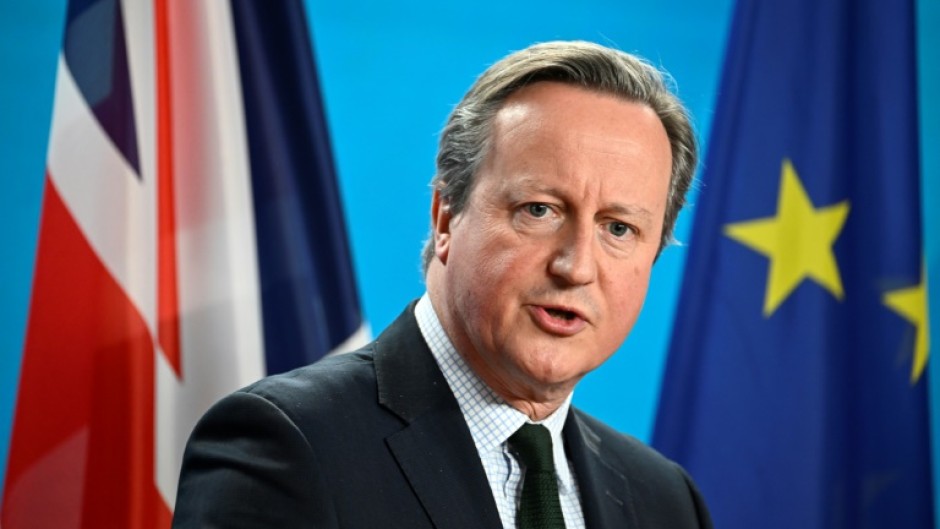LONDON - His legacy forever defined by Brexit, Britain's former prime minister David Cameron is hurriedly restoring his reputation -- and that of UK diplomacy -- as a globe-trotting foreign secretary.
The 57-year-old has become a high-profile figure on the world stage again, visiting dozens of countries since his unexpected return last November from the political wilderness, which included a lobbying scandal.
With polls indicating Prime Minister Rishi Sunak's ruling Conservatives will lose a general election due this year, Cameron knows his time as Britain's top diplomat is likely to be short -- so he is making the most of it.
"I think for him this is partly about rehabilitation of his image after Brexit and after some of the things that happened when he left office," Simon Fraser, the top civil servant at the Foreign Office during Cameron's premiership, told AFP.
"He's a man with a personal mission."
Cameron, who became prime minister in 2010, quit in July 2016 after his European Union referendum gamble spectacularly backfired when Britons voted to leave the bloc.
He retreated to a bespoke £25,000 ($31,000) shepherd's hut in his country garden to pen his memoirs as parliament wrangled over what Brexit would exactly look like.
-'Unfinished business' -
Cameron became embroiled in scandal in 2021 after lobbying the government for finance group Greensill Capital, which later collapsed.

He also endured flak for promoting a Chinese investment project, at a time when senior British lawmakers were calling for tougher action against Beijing.
"His reputation was being quite seriously tarnished," just at the time Sunak brought him in from the cold, Anand Menon, director of the UK in a Changing Europe think-tank, told AFP.
"I'm sure there was a sense of unfinished business when he decided to take the job."
His return to frontline British politics after more than seven years away stunned Westminster, with commentators and opposition lawmakers pointing out his mixed foreign policy record as prime minister.
They cited Britain's failure to respond to a 2013 chemical attack blamed on Syrian government forces and his leading role in an international intervention to topple Moamer Kadhafi in 2011, after which Libya plunged into crisis.
In a speech Thursday, Cameron said he had been "determined to make every day count" of his six months as foreign secretary so far.
By his own tally, he has visited 33 countries across six continents, including Ukraine, Israel, and the United States, where he urged Donald Trump to persuade Republicans to unlock military aid to Kyiv.
Cameron became the first British foreign secretary to visit Kyrgyzstan, Tajikistan and Turkmenistan, and even turned up in the remote British overseas territory of the Falkland Islands.
"He is a man in a hurry," noted Fraser.
Allies say he is enjoying using the influence and contacts he made as prime minister, while civil servants credit him with injecting energy and gravitas into the foreign office following less serious predecessors like Boris Johnson and Liz Truss.

"He's got the experience of the key issues and he's obviously got a sort of international reach and a network, which gives access as we saw with Trump," said Fraser.
Menon said Cameron is "quite a smooth operator, a good talker", which "makes a difference in the world of diplomacy".
- PM abroad? -
Sunak is said to have trusted Cameron with the foreign affairs job so he can focus on the domestic agenda and try to turn around double-digit deficits in the opinion polls to the main Labour opposition before the election.
Some in Westminster have dubbed Cameron the "prime minister for external affairs".
Insiders note that because he is a member of the unelected House of Lords and untethered from the parliamentary Conservative party he feels he has the freedom to take more risks, like his meeting with Trump.

Observers say he has also been more critical of Israel's response to Hamas's deadly attack than other ministers and has appeared to suggest that Britain could recognise a Palestinian state before a peace deal is signed.
"If you look at Gaza, I think he gave some nuance and a more distinctive voice to British policy there, which had previously been just a pale shadow of American policy," said Fraser.
But with a new foreign secretary likely after the election, it is not yet clear what new legacy Cameron will leave behind.
"He's been competent, he's been high profile, he's been meeting the right people, he's been travelling widely, people seem to be listening to what he says.
"You couldn't really ask for more than that," concluded Menon.
- by Peter Hutchison

